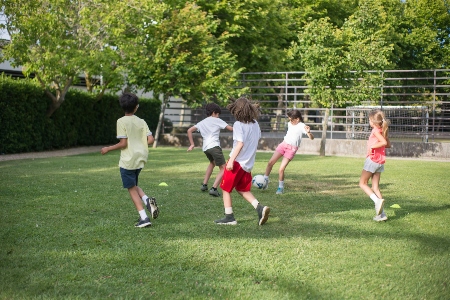Exploring hobbies to improve wellbeing #BeeWell
Read this article, in collaboration with #BeeWell, to understand how hobbies can not only benefit your wellbeing, but help you in your next steps.



What are hobbies?
Hobbies are activities that people do during their free time, for enjoyment. Most people find time for hobbies in the evenings after school or work, or on the weekends when they have less responsibilities. Hobbies can be done on your own or can be used as a great way to spend time with family and friends, and the multitude of hobbies that exist cater for our different interests and skills. These can take the form of physical exercise, such as participating in sports clubs, or can include arts and crafts or cooking and baking. Hobbies are an outlet for people to engage in creative, physical, or intellectual pursuits that teach us as lessons about ourselves and how we interact with the world!
Why is taking up a hobby a good thing?
Firstly, hobbies are an excuse for us to try something new! This may be an activity that you’ve wanted to try for a while but didn’t know how to get into. By getting involved in hobbies that involve a group, it may be easier to start something new with the help of a mentor or peer.
Secondly, hobbies help us find a healthy balance between education/ work and our social lives. We all have responsibilities, for example attending school and doing homework. For some, there may be added responsibilities at home such as caring for someone else or cooking meals. These responsibilities look different for everyone and can cause stress and pressures that may feel overwhelming sometimes. Hobbies can last for as long or as short as you want them to, and by incorporating them into our everyday lives, hobbies help us separate from our responsibilities and find time to rest and relax whilst doing something we enjoy.
Thirdly, research indicates towards participation in extra-curricular activities as a means to improve our psychological and physical development. Having a hobby can improve our cognitive skills (our mental abilities) such as memory, attention, concentration, and problem solving. Increasing our ability to remember and process information, and the fact that hobbies play a key role in promoting creativity and imagination suggests that by improving cognitive skills, we will perform better in education and work. Hobbies also develop our physical (fine motor) skills, such as sitting, standing, walking and running. The science behind physical exercise boosting mood, through increased levels of neurotransmitters such as serotonin and dopamine suggests that hobbies lower levels of depression and anxiety in young people, whilst improving physical health. Hobbies also build our self-esteem and confidence by allowing us to successfully overcome presented challenges.
This is reinforced by #BeeWell research findings, which show that those who participate in arts, culture, and entertainment (PACE) activities have higher overall wellbeing compared to those who don’t. Equally, findings show that around 1 in 5 young people are disengaged from PACE activities, and therefore it is important to access the extracurricular activities available to you, in order to enrich your personal life and improve wellbeing!
How can a hobby help you with your next steps?
Hobbies aren’t just fun activities! They can be invaluable when you apply to universities and workplaces. For example, when it comes to CV’s and personal statements, potential employers and institutions look for candidates who have well-rounded personal lives. This is due to the multitude of skills that can be learned through engaging in group hobbies, such as good communication and the ability to get on with a diverse mix of people. For example, these skills can be built by completing The Duke of Edinburgh award, a non-competitive programme of adventurous activities spanning across different year groups and ages. Universities favour this award as it challenges you both physically and psychologically, whilst teaching you valuable leadership qualities!
Equally, volunteering with an organisation or charity, or partaking in part time work shows a level of professionalism and dedication to a role. This means you can build a bank of employable skills, whilst getting paid!

Where should I start if I am looking for a hobby?
Sports and exercise
If you are looking to participate in any of the following hobbies or clubs, a really useful first point of call could be asking your school, college or university about the free extracurricular clubs they offer that would suit you.
Alternatively, you could look into the sports clubs hosted in your local area. This is really easy to do; simply search for the name of the sports club you want to join and add your postcode to find relevant results. Similarly, you could look into your local Active Partnership– these organisations offer the knowledge of a range of sports and physical activity in your area which you may find useful. Facebook groups can also be a great way to find out about events near you and make friends who share similar interests.
My suggestion for those looking to get into running would be to join parkrun– a free, community event where you can walk, jog, run, volunteer or spectate in whichever way you feel most comfortable, and should take place every Saturday morning in your local area. Junior parkrun is open to those aged 4-14, and adult parkrun is available to those aged older than this. Parkrun is a positive and welcoming event and can be a great way to spend time with family and friends.
Similarly, Couch to 5K is a useful running plan to help beginners get fit. The plan involves three runs a week, with a day of rest in between each of them for nine weeks. Even if you don’t complete the programme, it can be used as a fun way to get some fresh air and exercise whilst getting some guidance from a virtual mentor.
For those interested in football, the Manchester City Football Club offers goalkeeper programmes to young people aged 9-14. This caters for all genders and abilities and aims to improve technique and game understanding. Similarly, The Young Player Development Programme is open to those aged 5-12, with the chance to train, develop their football skills and make friends in the place that their heroes play every day. There is a charge to this, and so alternatively you can contact your local football team to ask if they have any youth friendly events that might be of interest.
If you do choose to take up exercise as a hobby, I would suggest that you wear a sensible and supportive pair of trainers to avoid injury, and ensure you wear breathable, bright and flexible clothing. Ensure that you choose safe and familiar routes whilst out and about, run on the side of oncoming traffic, and bring a friend or a family member along with you.
Arts and Crafts
You can get involved with Creative City England CIC, a social enterprise based in Manchester help young people and women have fun, gain confidence, improve their wellbeing and connect to their community.
Equally, your local library may hold events that allow you to try something new and make friends from your local community. You can find these online, or by asking in-person.
Factory International run Manchester International Festival (MIF), a bank of artwork from all over the world that you can observe and get involved in!
You can also get crafty at home- I have personally found that scrapbooking and colouring is a great way to practice mindfulness and get creative without spending lots of money!
Cooking/baking
The Organic Cookery School holds a DofE approved Community Chef Volunteering Programme for young people, as well as a pre university student Foodie Summer Bootcamp available for students aged 16 years and over. This teaches young people how to reduce waste and eat well on a budget both at university and during their future years.
Similarly, the Jamie Oliver website has lots of easy, cheap and healthy recipes which you can follow at home, to experiment using different ingredients and treat family and friends to delicious food!
If you do choose to cook and bake as a hobby, it’s important to refresh yourself on how to be safe in the kitchen, and ask a trusted adult to supervise you to avoid injuries.
Singing
The National Youth Music Theatre (NYMT) offers musical training to young people aged 10-23- teaching skills workshops, masterclasses and residential courses led by industry professionals. The Musical Theatre Company also holds beginner and improvers courses which if completed, qualify you to audition for their annual summer production and Christmas pantomime. There is a charge for skills courses, and so alternatively you could get in touch with your local musical theatre to ask what clubs and opportunities they hold for young people!
For those interested in dance as a hobby, One Dance UK recruit dance ambassadors aged 18-25 from across the UK who are passionate about championing dance in their local community. You do not have to be studying or working in dance to be an ambassador, simply willing to take part in in-person and online sessions and make a difference by volunteering your time to One Dance UK’s projects!
For those interested in music, The National Youth Choir runs choirs for enthusiastic members from around the UK, aged between 9-25. All members can take part in residential courses, concerts and performances, and engage in training programmes for aspiring artists. Band on The Wall is also the venue for many music events within Manchester, and you can find out about these events on their website.
Reading
Your local library will allow you to loan books and join or found reading groups for free! To access this, you will need to sign up as a member. You can do this online or in person.
Once you have done this, you can take part in the Summer Reading Challenge at your local library. Through this, you can set a reading goal and obtain a reward for achieving it! This can be done alone, or use it as a great way to spend time with friends during the summer.
Museums
The Manchester Science and Industry Museum offers free museum admission tickets for individuals and groups, and holds various events and volunteering opportunities that may be of interest.
Similarly, the Manchester Museum offers free family activities during summer, including arts and crafts such as creating your own dinosaur fossils and home decorations! Relevant events can be found on the website link above.
Whitworth gallery also holds free family activities such as multisensory exhibitions, outdoor arts clubs and play days which run throughout summer. Again, relevant events can be found on the website link above!
The National Football Museum offers tours and a wide range of other activities. These can be great ways to spend time with family and friends, whilst learning a new hobby or skill!
Find out more
Finally, Visit Manchester is an informative website highlighting upcoming events in Manchester that are available to the public. It offers information on eating and drinking, shopping, things to see and do and a general idea of what’s going on. I’d advise that you use this to look for hobbies you can do with your friends, in addition to the Curriculum for Life Website, which offers further advice on finding hobbies that enrich your life and improve your wellbeing!

Related

Staying safe for Halloween
[rt_reading_time...

National Dyslexia Week: Thinking Differently About Dyslexia
[rt_reading_time...
